人教新目标八年级英语下册Unit 5 What were you doing when the rainstorm came?知识点归纳练习(无答案)
文档属性
| 名称 | 人教新目标八年级英语下册Unit 5 What were you doing when the rainstorm came?知识点归纳练习(无答案) | 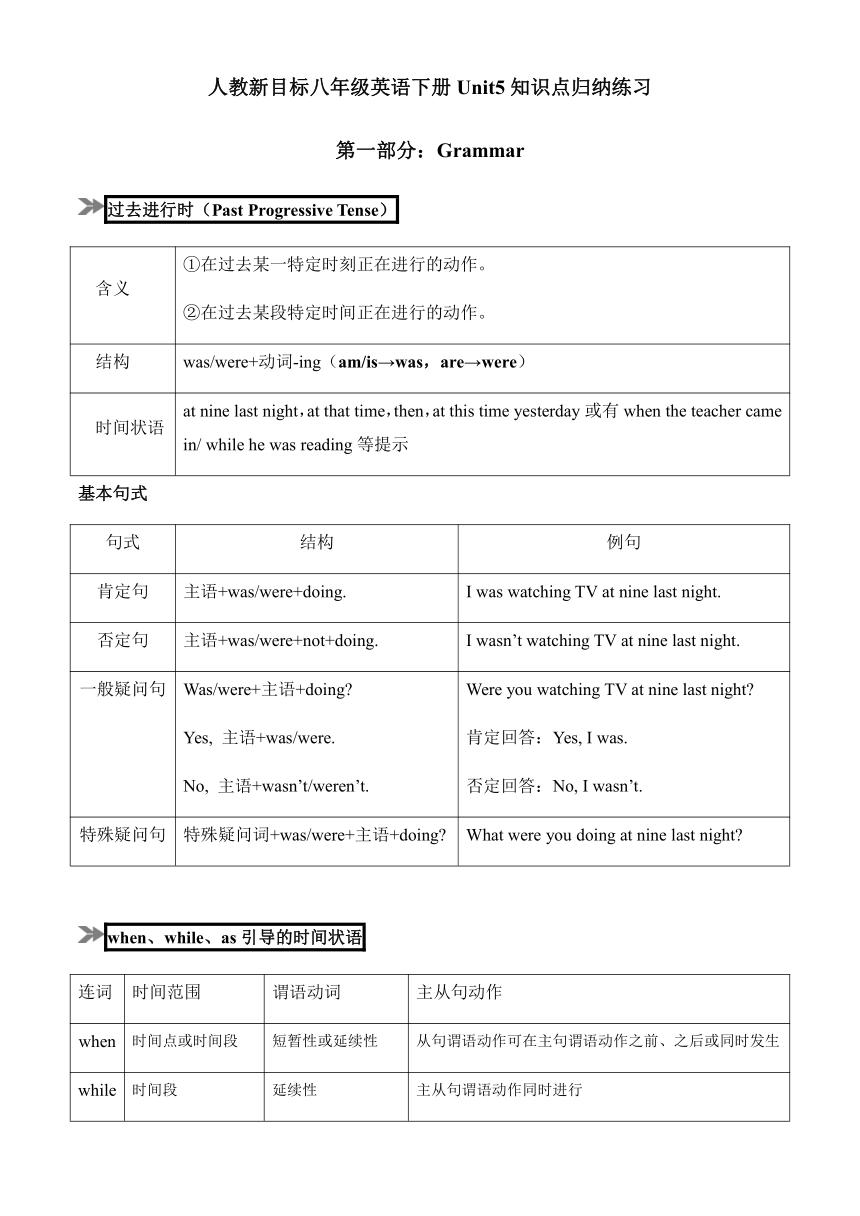 | |
| 格式 | docx | ||
| 文件大小 | 136.6KB | ||
| 资源类型 | 教案 | ||
| 版本资源 | 人教新目标(Go for it)版 | ||
| 科目 | 英语 | ||
| 更新时间 | 2021-05-30 16:11:40 | ||
图片预览

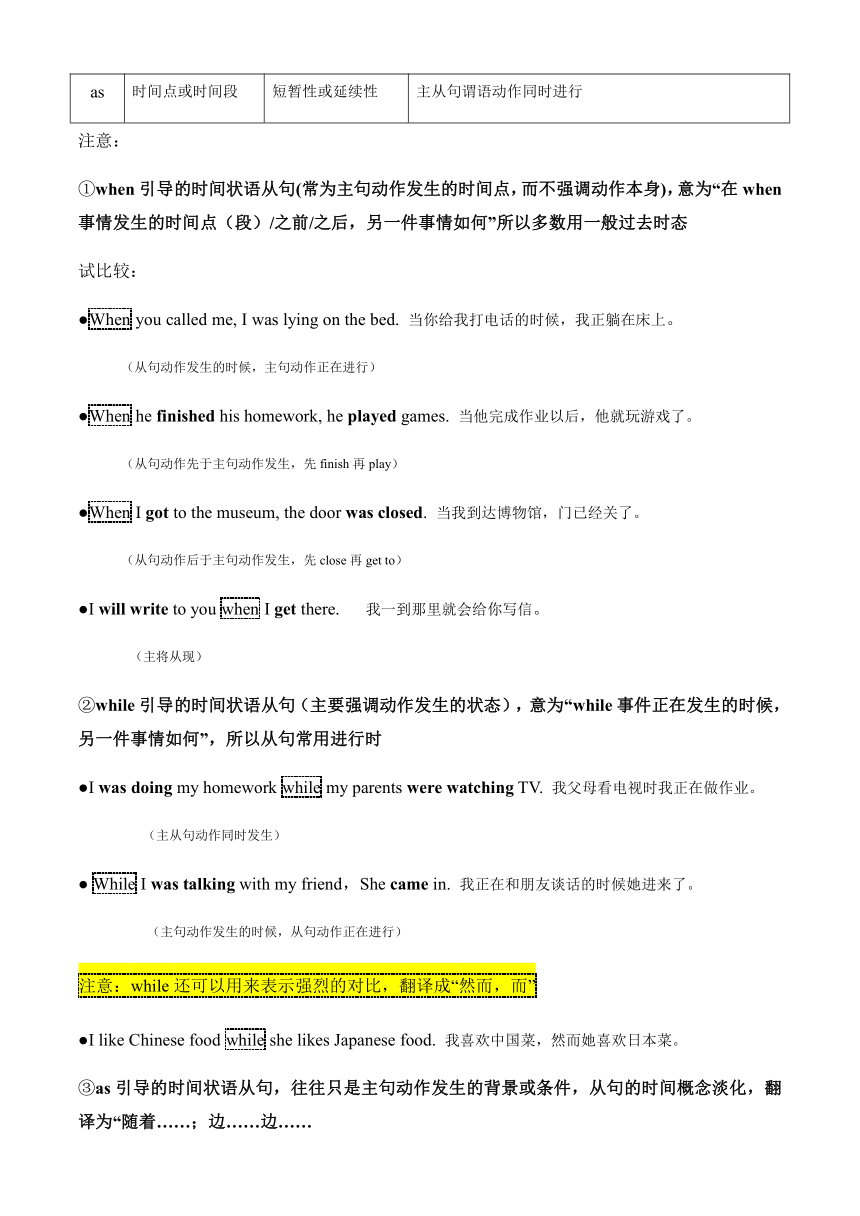
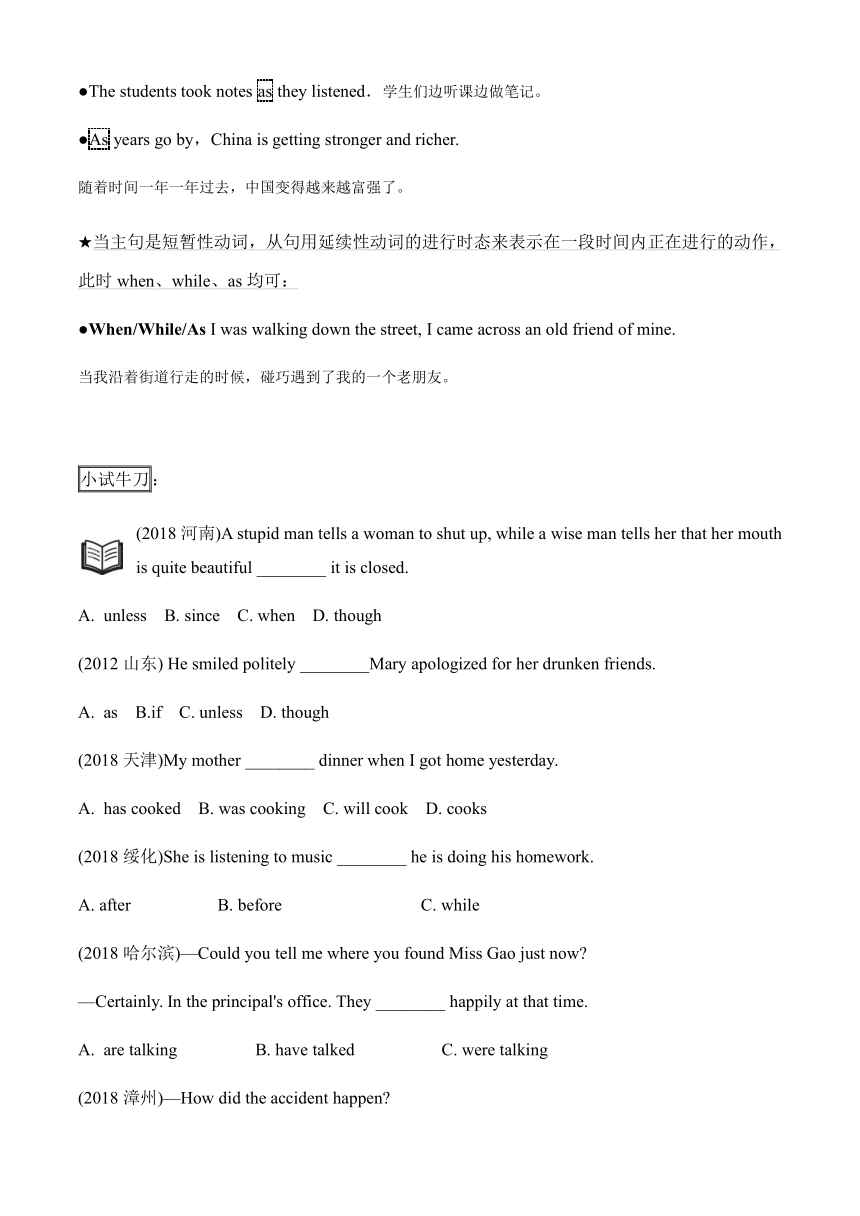
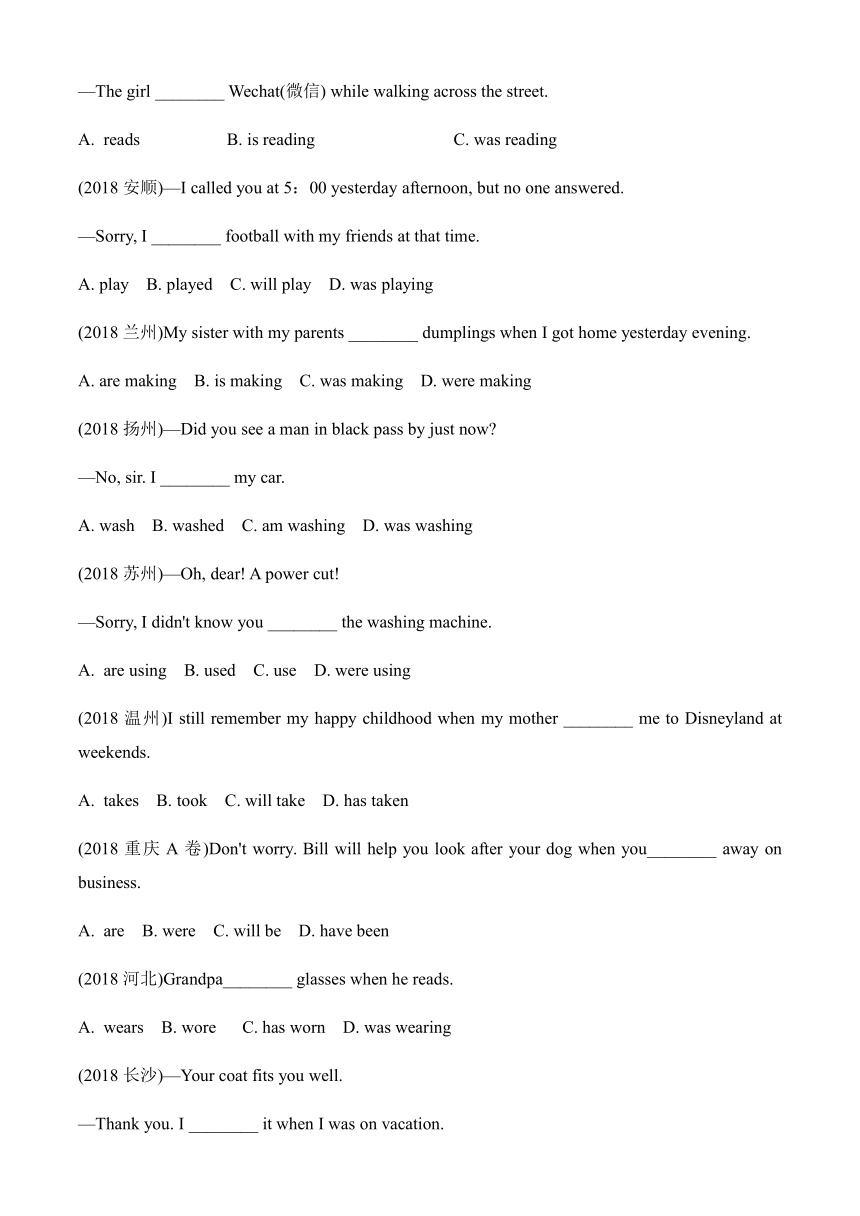
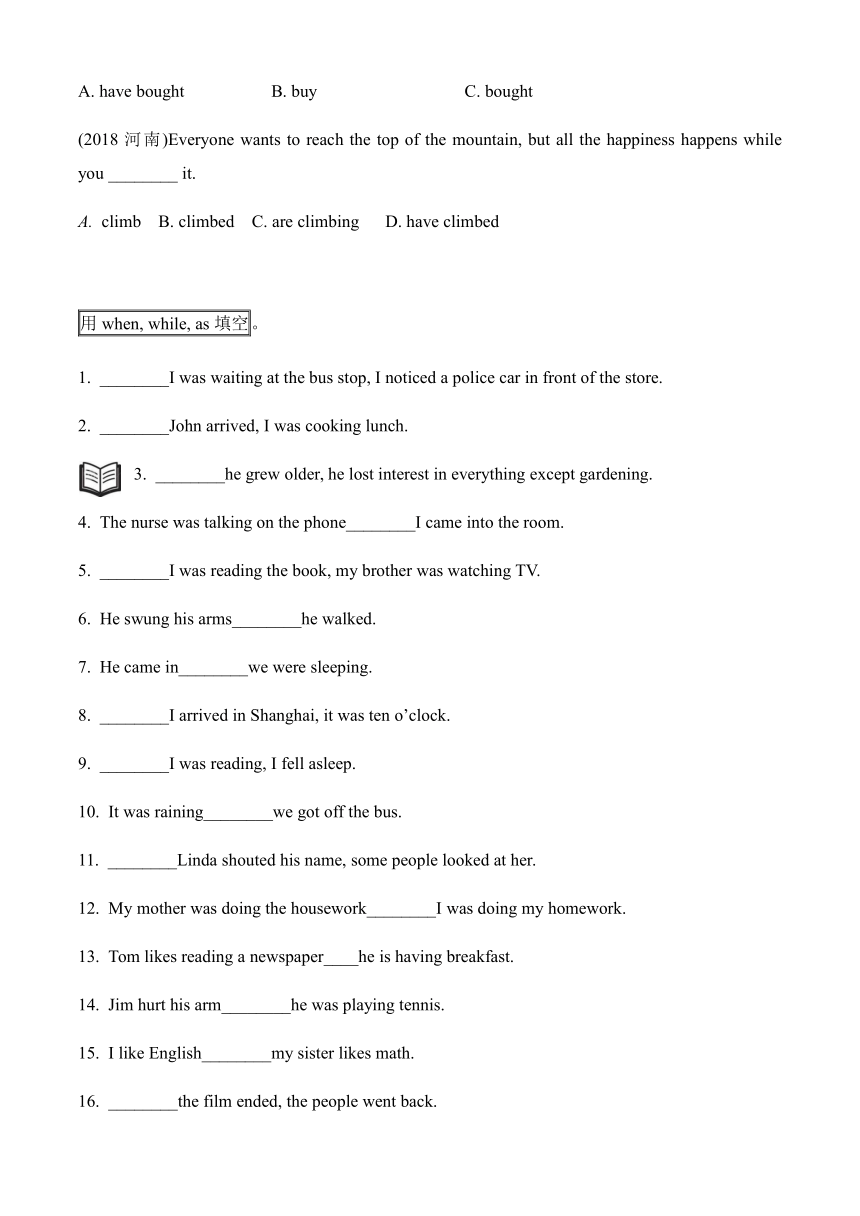
文档简介
人教新目标八年级英语下册Unit5知识点归纳练习
第一部分:Grammar
过去进行时(Past Progressive Tense)
含义
①在过去某一特定时刻正在进行的动作。
②在过去某段特定时间正在进行的动作。
结构
was/were+动词-ing(am/is→was,are→were)
时间状语
at nine last night,at that time,then,at this time yesterday或有when the teacher came in/ while he was reading等提示
基本句式
句式
结构
例句
肯定句
主语+was/were+doing.
I was watching TV at nine last night.
否定句
主语+was/were+not+doing.
I wasn’t watching TV at nine last night.
一般疑问句
Was/were+主语+doing?
Yes, 主语+was/were.
No, 主语+wasn’t/weren’t.
Were you watching TV at nine last night?
肯定回答:Yes, I was.
否定回答:No, I wasn’t.
特殊疑问句
特殊疑问词+was/were+主语+doing?
What were you doing at nine last night?
when、while、as引导的时间状语
连词
时间范围
谓语动词
主从句动作
when
时间点或时间段
短暂性或延续性
从句谓语动作可在主句谓语动作之前、之后或同时发生
while
时间段
延续性
主从句谓语动作同时进行
as
时间点或时间段
短暂性或延续性
主从句谓语动作同时进行
注意:
①when引导的时间状语从句(常为主句动作发生的时间点,而不强调动作本身),意为“在when事情发生的时间点(段)/之前/之后,另一件事情如何”所以多数用一般过去时态
试比较:
●When you called me, I was lying on the bed. 当你给我打电话的时候,我正躺在床上。
(从句动作发生的时候,主句动作正在进行)
●When he finished his homework, he played games. 当他完成作业以后,他就玩游戏了。
(从句动作先于主句动作发生,先finish再play)
●When I got to the museum, the door was closed. 当我到达博物馆,门已经关了。
(从句动作后于主句动作发生,先close再get to)
●I will write to you when I get there. 我一到那里就会给你写信。
(主将从现)
②while引导的时间状语从句(主要强调动作发生的状态),意为“while事件正在发生的时候,另一件事情如何”,所以从句常用进行时
●I was doing my homework while my parents were watching TV. 我父母看电视时我正在做作业。
(主从句动作同时发生)
● While I was talking with my friend,She came in. 我正在和朋友谈话的时候她进来了。
(主句动作发生的时候,从句动作正在进行)
注意:while还可以用来表示强烈的对比,翻译成“然而,而”
●I like Chinese food while she likes Japanese food. 我喜欢中国菜,然而她喜欢日本菜。
③as引导的时间状语从句,往往只是主句动作发生的背景或条件,从句的时间概念淡化,翻译为“随着……;边……边……
●The students took notes as they listened.学生们边听课边做笔记。
●As years go by,China is getting stronger and richer.
随着时间一年一年过去,中国变得越来越富强了。
★当主句是短暂性动词,从句用延续性动词的进行时态来表示在一段时间内正在进行的动作,此时when、while、as均可:
●When/While/As I was walking down the street, I came across an old friend of mine.
当我沿着街道行走的时候,碰巧遇到了我的一个老朋友。
279404743450小试牛刀:
(2018河南)A stupid man tells a woman to shut up, while a wise man tells her that her mouth is quite beautiful ________ it is closed.
unless B. since C. when D. though
(2012山东) He smiled politely ________Mary apologized for her drunken friends.
as B.if C. unless D. though
(2018天津)My mother ________ dinner when I got home yesterday.
has cooked B. was cooking C. will cook D. cooks
(2018绥化)She is listening to music ________ he is doing his homework.
A. after B. before C. while
(2018哈尔滨)—Could you tell me where you found Miss Gao just now?
—Certainly. In the principal's office. They ________ happily at that time.
are talking B. have talked C. were talking
(2018漳州)—How did the accident happen?
—The girl ________ Wechat(微信) while walking across the street.
reads B. is reading C. was reading
(2018安顺)—I called you at 5:00 yesterday afternoon, but no one answered.
—Sorry, I ________ football with my friends at that time.
A. play B. played C. will play D. was playing
(2018兰州)My sister with my parents ________ dumplings when I got home yesterday evening.
A. are making B. is making C. was making D. were making
(2018扬州)—Did you see a man in black pass by just now?
—No, sir. I ________ my car.
A. wash B. washed C. am washing D. was washing
(2018苏州)—Oh, dear! A power cut!
—Sorry, I didn't know you ________ the washing machine.
are using B. used C. use D. were using
(2018温州)I still remember my happy childhood when my mother ________ me to Disneyland at weekends.
takes B. took C. will take D. has taken
(2018重庆A卷)Don't worry. Bill will help you look after your dog when you________ away on business.
are B. were C. will be D. have been
(2018河北)Grandpa________ glasses when he reads.
wears B. wore C. has worn D. was wearing
(2018长沙)—Your coat fits you well.
—Thank you. I ________ it when I was on vacation.
A. have bought B. buy C. bought
(2018河南)Everyone wants to reach the top of the mountain, but all the happiness happens while you ________ it.
climb B. climbed C. are climbing D. have climbed
88904057650用when, while, as填空。
________I was waiting at the bus stop, I noticed a police car in front of the store.
________John arrived, I was cooking lunch.
________he grew older, he lost interest in everything except gardening.
The nurse was talking on the phone________I came into the room.
________I was reading the book, my brother was watching TV.
He swung his arms________he walked.?
He came in________we were sleeping.
________I arrived in Shanghai, it was ten o’clock.
________I was reading, I fell asleep.
It was raining________we got off the bus.
________Linda shouted his name, some people looked at her.
My mother was doing the housework________I was doing my homework.
Tom likes reading a newspaper____he is having breakfast.
Jim hurt his arm________he was playing tennis.?
I like English________my sister likes math.?
________the film ended, the people went back.
___time goes by,there will be greater changes here
第二部分:词汇用法
Section A
1、What were people doing yesterday at the time of the rainstorm? 昨天当暴风雨来临的时候人们正在做些什么?
1)at the time of…… 在……的时候(常用于过去进行时)
● at the time of the earthquake? 地震的时候你的妈妈正在干什么?
2)rainstorm n.暴风雨
raincoat 雨衣 raindrop雨滴?rainbow 彩虹rainfall降雨rainforest 热带雨林
thunderstorm 雷雨 snowstorm 暴风雪 sandstorm 沙暴你
拓展:storm →stormy adj. 有暴风雨(或暴风雪)的; 群情激愤的; 激烈争吵的
①n. 暴风雨 a heavy/violent/fierce storm 一场强风暴
②v. 突袭,攻占,闯,冲,怒吼
●He stormed out of the room. 他愤怒地走出了屋子。
2、My alarm didn’t go off so I woke up late. 我的闹钟没有响,因此我醒晚了。
1)go off ①(闹钟)发出响;(声警报器) 突然大响
●When the fire alarm ,everyone ran out quickly. 当火警想起,所有人都飞快地跑了出去。
②离开(去做某事)
●She get a drink. 她去拿饮料了。
③开火;爆炸
●The gun went off by accident. 枪走火了。
拓展:get off下车 take off (飞机)起飞;脱下 turn off 关掉 put off 推迟 fall off 掉落
2)wake up (wake-woke-woken)①醒来;活跃起来
●What do you usually ? 通常你早晨几点醒来?
●Wake up and listen! 打起精神注意听。
②wake sb up(代词放中间,名词放两边)唤醒某人;使某人清醒/活跃
●Why do you ? 你为什么这么早叫醒我?
●A cold shower will soon . 一个凉水澡很快能让你清醒。
拓展:awake adj. 醒着的,常放在系动词keep,be,stay之后作表语,反义词:asleep 睡着的
●I stayed awake all last night. 我昨晚一夜未睡。
3、I was waiting for the bus when it began to rain heavily. 当天开始下大雨的时候我正在等公交车。
1)wait v. 等待,等候;盼望,期待 waiting n. 等待 waiter 服务员waitress 女服务员
①wait for sb/sth 等待某人/某物
● outside. 有一个男孩正在外面等你。
②wait (for sb/sth) to do sth 等待某人/某物做某事
can’t wait to do sth 等不及做某事
●I am . 我正等着你帮我。
拓展:wait a minute/moment/second 稍等一下 wait and see等着瞧 (just) you wait 你等着瞧
2)begin (began→begun→beginning) v. 开始=start
①begin to do sth / begin doing sth 开始做某事
●When did you ? 你什么时候开始学英语?
②begin at/with sth 从……开始
●Let’s . 让我们从第一页开始。
拓展:to start with=at first 首先,起初,开始
3)heavily adv. 在很大程度上, 大量的,(形容雨雪下得大的时候用heavily/hard)反义词:lightly
● when I arrived home. 当我到家的时候正下着大雨。
●My father . 我爸爸抽烟很凶。
4、 I ran to the bus stop… but I still missed the bus. 我奔向公共汽车站但还是错过了公共汽车。
1)miss v. (missed→missed→missing)
①错过 miss doing sth 错过做某事
● the last chance. 不要错过最后一次机会。
●I don’t want to tonight. 我不想错过今天晚上的电影。
②想念;思念
●I miss you so much. 我非常想念你。
2)n. 称谓
①用于未婚女子姓氏或姓名前,以表示礼貌。但首字母要大写,“小姐;女士”
②学生对女老师的称呼。
拓展:missing adj. 丢失的,缺少的,失踪 the missing person 下落不明者
5、so ,when the rainstorm suddenly came, what were you doing? 那么,当暴风雨突然来临的时候,你正在做什么呢?
suddenly adv. 突然,猛地,骤然(可放句首、句中、句末)
sudden adj. 突然的,忽然的,骤然的
●His death was very . 他的死很突然。
●It all happened so . 一切来得那么突然。
拓展:all of a sudden 突然,猛地
●A question came to me all of a sudden. 我突然想起一个问题啊。
6、I called at seven and you didn’t pick up. 我七点钟给你打电话,你没有接。
1)pick v. 选择;挑选;采摘;剔除
pick sb/sth to do sth 挑选某人/某物做某事
●Please pick a number from one to ten. 请从一到十中挑选一个数字。
●Can you help me pick grapes? 你能帮我摘下葡萄吗?
●The dogs picked the bones clean. 狗把骨头啃干净了。
2)pick up sb/sth (代词放中间,名词放两边)
①接电话
●Why didn’t you yesterday evening? 昨天晚上你为什么不接我电话?
②捡起;拾起;拿起;举起
●He and went away. 他捡起他的帽子走了。
③(开车)接某人
●I will at the station. 我会在车站接你。
④学到;获得
●She when she was living in London. 她在伦敦居住的时候学会了英语。
⑤接收(信号、声音、图像等)
●I need to buy a radio to pick up BBC English programs. 我需要买个收音节机来接收BBC英语节目。
7、I see. I called again at eight and you didn’t answer then either. 我八点钟又给你打电话,你也没有接。
回顾:either…or…要么…要么(连接并列主语要遵循就近原则)
●Either you or he is right. 要么你要么他是对的。
either
用在否定句中,通常放在句末(用逗号隔开)
Peter can’t go and I can’t either.
too
用在肯定句中,通常放在句末(用逗号隔开)
I love you too.
also
实前be后情助之后或句首
I also agree with you.
as well
用在肯定句中,通常放在句末(不用逗号隔开)
I know Japanese as well.
as well as
用在肯定句中,就远原则,强调前者
He as well as his parents likes pop music.
With no light outside, it felt like midnight. 外面没有一丝光亮,让人感觉这是在午夜。
with+宾语+宾语补足语:
①with或without-名词/代词+形容词
She likes sleep with the windows open.
②with或without-名词/代词+副词
The boy stood there with his head down.
③with或without-名词/代词+介词短语
The teacher came in with a book in her hand.
④with或without-名词/代词?+现在分词
He lay on the grass with his eyes looking at the sky.
⑤with或without-名词/代词?+过去分词
He lay in bed with his eyes closed.
⑥with或without-名词/代词?+不定式
I decide to stay at home with a lot of homework to do.
2)light
388747048260①u.n 光线,光
●There is in the room. 房间里没有亮光。
②c.n 灯
●Don’t . 别关灯。
③adj. 轻的 反义词:heavy
●The box is to carry.这个盒子对
你来说足够的轻,你搬得动。
④adj. 浅色的 反义词:dark
●My new shirt is . 我的新衬衫是淡蓝色。
feel like
①摸起来像
●It feels like silk. 它摸起来像丝绸。
②感觉像是
●I .我感觉自己像只小鸟。
③想要 feel like sth/doing sth
●I feel like first. 我想要先洗个澡。
9、 The news on TV reported that a heavy rainstorm was in the area. 电视新闻报道,这个地区有一场大暴雨。
1)report
① v. 报道;报告;告发 → reporter n. 记者
It’s reported that…据报道…/据说…
●It is reported that five people died in the traffic accident. 据报道说,有5人死于那次交通事故。
report sth to sb 向某人汇报某事
●We must to the safety officer. 我们必须把事故上报给安全员。
report sb to sb 让某人告发某人
●
make a report 做报告 weather report 天气预报
give a report 作报告 It’s reported that… 据报道
I want to be a ___________(report) when I grow up.
第一部分:Grammar
过去进行时(Past Progressive Tense)
含义
①在过去某一特定时刻正在进行的动作。
②在过去某段特定时间正在进行的动作。
结构
was/were+动词-ing(am/is→was,are→were)
时间状语
at nine last night,at that time,then,at this time yesterday或有when the teacher came in/ while he was reading等提示
基本句式
句式
结构
例句
肯定句
主语+was/were+doing.
I was watching TV at nine last night.
否定句
主语+was/were+not+doing.
I wasn’t watching TV at nine last night.
一般疑问句
Was/were+主语+doing?
Yes, 主语+was/were.
No, 主语+wasn’t/weren’t.
Were you watching TV at nine last night?
肯定回答:Yes, I was.
否定回答:No, I wasn’t.
特殊疑问句
特殊疑问词+was/were+主语+doing?
What were you doing at nine last night?
when、while、as引导的时间状语
连词
时间范围
谓语动词
主从句动作
when
时间点或时间段
短暂性或延续性
从句谓语动作可在主句谓语动作之前、之后或同时发生
while
时间段
延续性
主从句谓语动作同时进行
as
时间点或时间段
短暂性或延续性
主从句谓语动作同时进行
注意:
①when引导的时间状语从句(常为主句动作发生的时间点,而不强调动作本身),意为“在when事情发生的时间点(段)/之前/之后,另一件事情如何”所以多数用一般过去时态
试比较:
●When you called me, I was lying on the bed. 当你给我打电话的时候,我正躺在床上。
(从句动作发生的时候,主句动作正在进行)
●When he finished his homework, he played games. 当他完成作业以后,他就玩游戏了。
(从句动作先于主句动作发生,先finish再play)
●When I got to the museum, the door was closed. 当我到达博物馆,门已经关了。
(从句动作后于主句动作发生,先close再get to)
●I will write to you when I get there. 我一到那里就会给你写信。
(主将从现)
②while引导的时间状语从句(主要强调动作发生的状态),意为“while事件正在发生的时候,另一件事情如何”,所以从句常用进行时
●I was doing my homework while my parents were watching TV. 我父母看电视时我正在做作业。
(主从句动作同时发生)
● While I was talking with my friend,She came in. 我正在和朋友谈话的时候她进来了。
(主句动作发生的时候,从句动作正在进行)
注意:while还可以用来表示强烈的对比,翻译成“然而,而”
●I like Chinese food while she likes Japanese food. 我喜欢中国菜,然而她喜欢日本菜。
③as引导的时间状语从句,往往只是主句动作发生的背景或条件,从句的时间概念淡化,翻译为“随着……;边……边……
●The students took notes as they listened.学生们边听课边做笔记。
●As years go by,China is getting stronger and richer.
随着时间一年一年过去,中国变得越来越富强了。
★当主句是短暂性动词,从句用延续性动词的进行时态来表示在一段时间内正在进行的动作,此时when、while、as均可:
●When/While/As I was walking down the street, I came across an old friend of mine.
当我沿着街道行走的时候,碰巧遇到了我的一个老朋友。
279404743450小试牛刀:
(2018河南)A stupid man tells a woman to shut up, while a wise man tells her that her mouth is quite beautiful ________ it is closed.
unless B. since C. when D. though
(2012山东) He smiled politely ________Mary apologized for her drunken friends.
as B.if C. unless D. though
(2018天津)My mother ________ dinner when I got home yesterday.
has cooked B. was cooking C. will cook D. cooks
(2018绥化)She is listening to music ________ he is doing his homework.
A. after B. before C. while
(2018哈尔滨)—Could you tell me where you found Miss Gao just now?
—Certainly. In the principal's office. They ________ happily at that time.
are talking B. have talked C. were talking
(2018漳州)—How did the accident happen?
—The girl ________ Wechat(微信) while walking across the street.
reads B. is reading C. was reading
(2018安顺)—I called you at 5:00 yesterday afternoon, but no one answered.
—Sorry, I ________ football with my friends at that time.
A. play B. played C. will play D. was playing
(2018兰州)My sister with my parents ________ dumplings when I got home yesterday evening.
A. are making B. is making C. was making D. were making
(2018扬州)—Did you see a man in black pass by just now?
—No, sir. I ________ my car.
A. wash B. washed C. am washing D. was washing
(2018苏州)—Oh, dear! A power cut!
—Sorry, I didn't know you ________ the washing machine.
are using B. used C. use D. were using
(2018温州)I still remember my happy childhood when my mother ________ me to Disneyland at weekends.
takes B. took C. will take D. has taken
(2018重庆A卷)Don't worry. Bill will help you look after your dog when you________ away on business.
are B. were C. will be D. have been
(2018河北)Grandpa________ glasses when he reads.
wears B. wore C. has worn D. was wearing
(2018长沙)—Your coat fits you well.
—Thank you. I ________ it when I was on vacation.
A. have bought B. buy C. bought
(2018河南)Everyone wants to reach the top of the mountain, but all the happiness happens while you ________ it.
climb B. climbed C. are climbing D. have climbed
88904057650用when, while, as填空。
________I was waiting at the bus stop, I noticed a police car in front of the store.
________John arrived, I was cooking lunch.
________he grew older, he lost interest in everything except gardening.
The nurse was talking on the phone________I came into the room.
________I was reading the book, my brother was watching TV.
He swung his arms________he walked.?
He came in________we were sleeping.
________I arrived in Shanghai, it was ten o’clock.
________I was reading, I fell asleep.
It was raining________we got off the bus.
________Linda shouted his name, some people looked at her.
My mother was doing the housework________I was doing my homework.
Tom likes reading a newspaper____he is having breakfast.
Jim hurt his arm________he was playing tennis.?
I like English________my sister likes math.?
________the film ended, the people went back.
___time goes by,there will be greater changes here
第二部分:词汇用法
Section A
1、What were people doing yesterday at the time of the rainstorm? 昨天当暴风雨来临的时候人们正在做些什么?
1)at the time of…… 在……的时候(常用于过去进行时)
● at the time of the earthquake? 地震的时候你的妈妈正在干什么?
2)rainstorm n.暴风雨
raincoat 雨衣 raindrop雨滴?rainbow 彩虹rainfall降雨rainforest 热带雨林
thunderstorm 雷雨 snowstorm 暴风雪 sandstorm 沙暴你
拓展:storm →stormy adj. 有暴风雨(或暴风雪)的; 群情激愤的; 激烈争吵的
①n. 暴风雨 a heavy/violent/fierce storm 一场强风暴
②v. 突袭,攻占,闯,冲,怒吼
●He stormed out of the room. 他愤怒地走出了屋子。
2、My alarm didn’t go off so I woke up late. 我的闹钟没有响,因此我醒晚了。
1)go off ①(闹钟)发出响;(声警报器) 突然大响
●When the fire alarm ,everyone ran out quickly. 当火警想起,所有人都飞快地跑了出去。
②离开(去做某事)
●She get a drink. 她去拿饮料了。
③开火;爆炸
●The gun went off by accident. 枪走火了。
拓展:get off下车 take off (飞机)起飞;脱下 turn off 关掉 put off 推迟 fall off 掉落
2)wake up (wake-woke-woken)①醒来;活跃起来
●What do you usually ? 通常你早晨几点醒来?
●Wake up and listen! 打起精神注意听。
②wake sb up(代词放中间,名词放两边)唤醒某人;使某人清醒/活跃
●Why do you ? 你为什么这么早叫醒我?
●A cold shower will soon . 一个凉水澡很快能让你清醒。
拓展:awake adj. 醒着的,常放在系动词keep,be,stay之后作表语,反义词:asleep 睡着的
●I stayed awake all last night. 我昨晚一夜未睡。
3、I was waiting for the bus when it began to rain heavily. 当天开始下大雨的时候我正在等公交车。
1)wait v. 等待,等候;盼望,期待 waiting n. 等待 waiter 服务员waitress 女服务员
①wait for sb/sth 等待某人/某物
● outside. 有一个男孩正在外面等你。
②wait (for sb/sth) to do sth 等待某人/某物做某事
can’t wait to do sth 等不及做某事
●I am . 我正等着你帮我。
拓展:wait a minute/moment/second 稍等一下 wait and see等着瞧 (just) you wait 你等着瞧
2)begin (began→begun→beginning) v. 开始=start
①begin to do sth / begin doing sth 开始做某事
●When did you ? 你什么时候开始学英语?
②begin at/with sth 从……开始
●Let’s . 让我们从第一页开始。
拓展:to start with=at first 首先,起初,开始
3)heavily adv. 在很大程度上, 大量的,(形容雨雪下得大的时候用heavily/hard)反义词:lightly
● when I arrived home. 当我到家的时候正下着大雨。
●My father . 我爸爸抽烟很凶。
4、 I ran to the bus stop… but I still missed the bus. 我奔向公共汽车站但还是错过了公共汽车。
1)miss v. (missed→missed→missing)
①错过 miss doing sth 错过做某事
● the last chance. 不要错过最后一次机会。
●I don’t want to tonight. 我不想错过今天晚上的电影。
②想念;思念
●I miss you so much. 我非常想念你。
2)n. 称谓
①用于未婚女子姓氏或姓名前,以表示礼貌。但首字母要大写,“小姐;女士”
②学生对女老师的称呼。
拓展:missing adj. 丢失的,缺少的,失踪 the missing person 下落不明者
5、so ,when the rainstorm suddenly came, what were you doing? 那么,当暴风雨突然来临的时候,你正在做什么呢?
suddenly adv. 突然,猛地,骤然(可放句首、句中、句末)
sudden adj. 突然的,忽然的,骤然的
●His death was very . 他的死很突然。
●It all happened so . 一切来得那么突然。
拓展:all of a sudden 突然,猛地
●A question came to me all of a sudden. 我突然想起一个问题啊。
6、I called at seven and you didn’t pick up. 我七点钟给你打电话,你没有接。
1)pick v. 选择;挑选;采摘;剔除
pick sb/sth to do sth 挑选某人/某物做某事
●Please pick a number from one to ten. 请从一到十中挑选一个数字。
●Can you help me pick grapes? 你能帮我摘下葡萄吗?
●The dogs picked the bones clean. 狗把骨头啃干净了。
2)pick up sb/sth (代词放中间,名词放两边)
①接电话
●Why didn’t you yesterday evening? 昨天晚上你为什么不接我电话?
②捡起;拾起;拿起;举起
●He and went away. 他捡起他的帽子走了。
③(开车)接某人
●I will at the station. 我会在车站接你。
④学到;获得
●She when she was living in London. 她在伦敦居住的时候学会了英语。
⑤接收(信号、声音、图像等)
●I need to buy a radio to pick up BBC English programs. 我需要买个收音节机来接收BBC英语节目。
7、I see. I called again at eight and you didn’t answer then either. 我八点钟又给你打电话,你也没有接。
回顾:either…or…要么…要么(连接并列主语要遵循就近原则)
●Either you or he is right. 要么你要么他是对的。
either
用在否定句中,通常放在句末(用逗号隔开)
Peter can’t go and I can’t either.
too
用在肯定句中,通常放在句末(用逗号隔开)
I love you too.
also
实前be后情助之后或句首
I also agree with you.
as well
用在肯定句中,通常放在句末(不用逗号隔开)
I know Japanese as well.
as well as
用在肯定句中,就远原则,强调前者
He as well as his parents likes pop music.
With no light outside, it felt like midnight. 外面没有一丝光亮,让人感觉这是在午夜。
with+宾语+宾语补足语:
①with或without-名词/代词+形容词
She likes sleep with the windows open.
②with或without-名词/代词+副词
The boy stood there with his head down.
③with或without-名词/代词+介词短语
The teacher came in with a book in her hand.
④with或without-名词/代词?+现在分词
He lay on the grass with his eyes looking at the sky.
⑤with或without-名词/代词?+过去分词
He lay in bed with his eyes closed.
⑥with或without-名词/代词?+不定式
I decide to stay at home with a lot of homework to do.
2)light
388747048260①u.n 光线,光
●There is in the room. 房间里没有亮光。
②c.n 灯
●Don’t . 别关灯。
③adj. 轻的 反义词:heavy
●The box is to carry.这个盒子对
你来说足够的轻,你搬得动。
④adj. 浅色的 反义词:dark
●My new shirt is . 我的新衬衫是淡蓝色。
feel like
①摸起来像
●It feels like silk. 它摸起来像丝绸。
②感觉像是
●I .我感觉自己像只小鸟。
③想要 feel like sth/doing sth
●I feel like first. 我想要先洗个澡。
9、 The news on TV reported that a heavy rainstorm was in the area. 电视新闻报道,这个地区有一场大暴雨。
1)report
① v. 报道;报告;告发 → reporter n. 记者
It’s reported that…据报道…/据说…
●It is reported that five people died in the traffic accident. 据报道说,有5人死于那次交通事故。
report sth to sb 向某人汇报某事
●We must to the safety officer. 我们必须把事故上报给安全员。
report sb to sb 让某人告发某人
●
make a report 做报告 weather report 天气预报
give a report 作报告 It’s reported that… 据报道
I want to be a ___________(report) when I grow up.
同课章节目录
- Unit 1 What's the matter?
- Section A
- Section B
- Unit 2 I'll help to clean up the city parks.
- Section A
- Section B
- Unit 3 Could you please clean your room?
- Section A
- Section B
- Unit 4 Why don't you talk to your parents?
- Section A
- Section B
- Unit 5 What were you doing when the rainstorm came
- Section A
- Section B
- Review of Units 1-5
- Unit 6 An old man tried to move the mountains.
- Section A
- Section B
- Unit 7 What's the highest mountain in the world?
- Section A
- Section B
- Unit 8 Have you read Treasure Island yet?
- Section A
- Section B
- Unit 9 Have you ever been to a museum?
- Section A
- Section B
- Unit 10 I've had this bike for three years.
- Section A
- Section B
